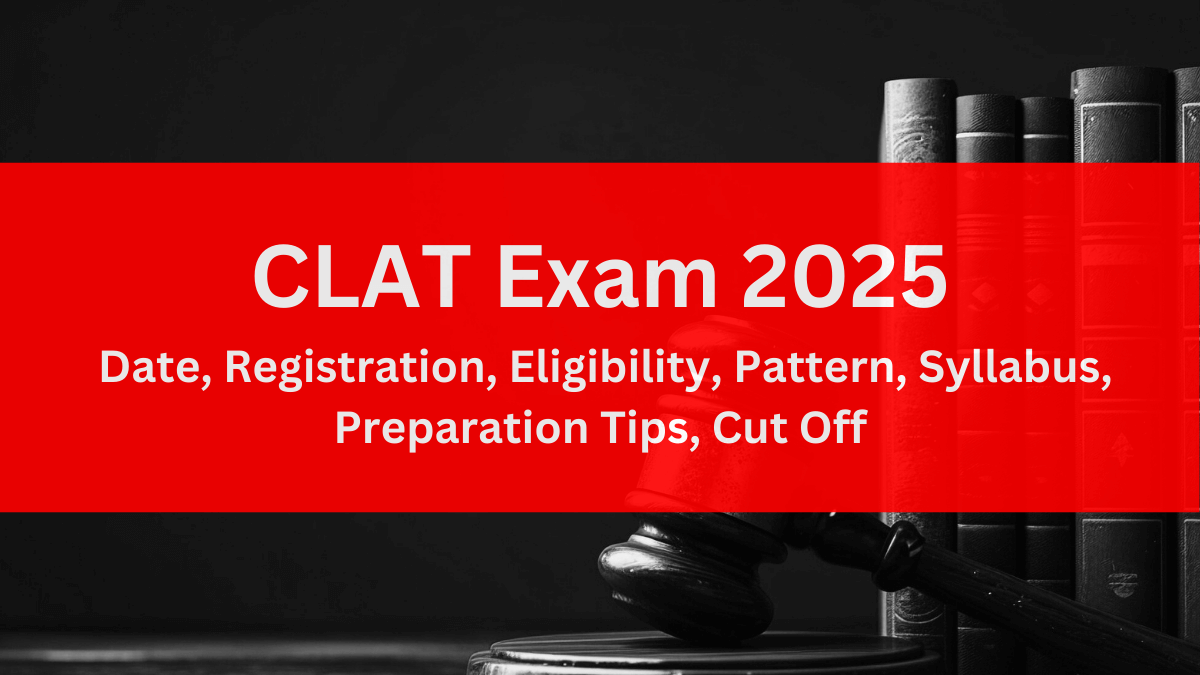CLAT Exam 2025: Date, Registration, Eligibility, Pattern, Syllabus, Preparation Tips, Cut Off
CLAT Exam 2025: The Consortium of National Law Universities (NLUs) opened the CLAT Exam 2025 application form on July 15, 2024, at noon Interested candidates can complete the registration online through the official website—consortiumofnlus.ac.in. The deadline to submit the application form is October 15, 2024. The direct link to complete the registration has been given below.

The consortium of NLUs will conduct CLAT 2025 on December 1, 2024. It has also issued the CLAT Exam 2025 notification, which mentions the registration dates and eligibility criteria for UG and PG programmes. The CLAT Exam 2025 scores will be accepted by 24 NLUs and over 60 law schools nationwide. Some Public Sector Undertakings (PSUs) will also use CLAT PG scores to recruit law officers.
Get ready for the CLAT with our FREE MOCK TEST guided by our experts.
CLAT Exam 2025 – Exam Overview
| Particulars | Details |
| Name of Examination | Common Law Admission Test |
| Popularly known as | CLAT |
| Conducting Body | Consortium of National Law Universities |
| Level | National level |
| Purpose | Admission to 5-year integrated LLB and LLM programmes. Recruitment in various Public Sector Undertakings (PSUs) |
| Colleges | 24 national law universities + over 60 affiliated law schools |
CLAT Exam 2025 Date
| Event | Dates |
| Release of CLAT 2025 admission notification | July 7, 2024 |
| CLAT 2025 application opens | July 15, 2024 |
| Last date to apply for CLAT 2025 | October 15, 2024 |
| Release of CLAT admit card | Third week of November 2024 |
| CLAT 2025 exam date | December 1, 2024 (Sunday, 2 pm to 4 pm) (Announced) |
| Release of provisional answer key | December 1, 2024 (Evening) |
| Release of final CLAT answer key | First week of December 2024 |
| CLAT 2025 result declaration | Second week of December 2024 |
CLAT Exam 2025 Eligibility Criteria
| Eligibility criteria | CLAT UG | CLAT PG |
| Education qualification | Class 12 or equivalent exam with at least 45% marks
(40% for SC and ST categories) |
Graduation in Law (3-year LLB or 5-year LLB) with at least 50% aggregate marks
(45% in the case of SC and ST candidates) |
| Candidates appearing in the qualifying exam are also eligible to appear in the CLAT 2024 | ||
| Age limit | No age limit | |
| Number of Attempts | No limit | |
CLAT Exam 2025 Application Form
The consortium has released the CLAT 2024-25 application form on July 15 2024. The application form of CLAT 2025 is available online at consortiumofnlus.ac.in. The last date to submit the CLAT 2024-25 application form is October 15, 2024. Candidates must register using their mobile number and email ID on the CLAT exam portal before completing the application form.
The CLAT 2024-25 application form can be completed in five simple steps. Candidates must keep their passport-size photo, signature, and credit/debit/UPI payment details while completing the application form.
The CLAT 2024-25 registration fee is Rs. 4,000 for general category candidates and Rs. 3,500 for SC and ST candidates. Before the application fee payment, candidates must provide their NLU preference for admissions.
Steps to Fill CLAT 2024-25 Application Form
Candidates can fill out the application form for CLAT 2024-25 by following the steps given below
- First, register with basic personal details as mobile number and email id to obtain login credentials.
- Next, login and fill out the application form with details such as communication address, academic qualifications, and other personal details.
- Mention the NLU’s preferences.
- Upload required documents
- Complete the fee payment and submit the application form
CLAT Exam 2025: Exam Pattern
| Attribute | Details |
| Exam Mode | Offline |
| Exam Centers | Designated national exam centres |
| Exam Duration | 2 hours |
| Question Type | Multiple-choice questions (comprehension-based) |
| Total Questions | 120 |
| Sections | 5 sections |
CLAT PG 2025 Exam Pattern
| Mode of Exam | Offline |
| Medium of Question Paper | English (only) |
| Type of Exam | Objective |
| Duration | 2 hours |
| Type of Questions | Objective Type |
| Number of Multiple Choice Questions | 120 |
| Marks Obtained for Correct Answer | +1 |
| Marks Deducted for Incorrect Answer | -0.25 |
| Topics Asked in MCQ | Application of Constitutional Law, Administrative Law, Criminal Law, Family Law, Property Law, Company Law, Labour Law, Environmental Law, etc. |
CLAT Exam Pattern 2025
| Subject | Number of questions | Percentage weightage |
| English Language | 22-26 questions | 20% |
| Current Affairs, including General Knowledge | 28-32 questions | 25% |
| Legal Reasoning | 28-32 questions | 25% |
| Logical Reasoning | 22-26 questions | 20% |
| Quantitative Techniques | 10-14 questions | 10% |
CLAT 2025 Syllabus [UG & PG]
| Subjects | Syllabus |
| English Language | 450 words passage based on contemporary or historically significant fiction and non-fiction writing |
| 5-6 questions testing comprehension and language skills | |
| Read and comprehend the main points, arguments, and viewpoints in the passage. | |
| Draw inferences and conclusions, summarise, compare and contrast arguments or viewpoints. | |
| Understand the meaning of words and phrases used in the passage | |
| Current Affairs & GK | 450 words passage based on news, journalistic sources, current affairs, and general knowledge, covering: |
| Contemporary events of significance from India and the world | |
| Arts and Culture | |
| International affairs | |
| Historical events of continuing significance | |
| Legal Reasoning | 450 words passage involving legal matters, public policy questions, or moral philosophical enquiry |
| Identify and infer rules and principles in the passage | |
| Apply rules and principles to various fact situations | |
| Understand how changes to laws or principles may alter their application to different fact situations | |
| Logical Reasoning | Series of short passages (about 300-350 words each) |
| Recognize arguments, premises, and conclusions | |
| Read and identify arguments in the passage | |
| Critically analyze patterns of reasoning and assess the effectiveness of arguments | |
| Infer from the passage, apply inferences to new situations, draw relationships, and identify contradictions or equivalences. | |
| Quantitative Techniques | Short sets of facts or propositions, graphs, or other textual, pictorial, or diagrammatic representations |
| Derive, infer, and manipulate numerical information from passages, graphs, or other representations. | |
| Apply 10th-standard mathematical operations, such as ratios and proportions, introductory algebra, measurement, and statistical estimation. |
CLAT PG 2025 Syllabus
The PG syllabus is also based on comprehension-based questions. Last year’s notification removed the descriptive section from the syllabus.
| Constitutional Law | Jurisprudence |
| Torts | Family Law |
| Company Law | Public International Law |
| Labour Law | Industrial Law |
Sign up for the CLAT Classroom live -online 2025 program is designed to efficiently build your overall skills in all the CLAT domains to help you crack the NLU cutoffs and the personal interviews.
CLAT Exam 2025: Cut-Off Marks
The Consortium decides the CLAT cutoff based on various factors like the difficulty level of the exam, the number of seats, and the number of students appearing for the exam.
Here is essential information based on CLAT 2024 first allotment list:
1] Category-Wise Opening and Closing Ranks:
- General: The range varies significantly, with top NLUs like NLU Bangalore having an opening rank of 1 and a closing rank of 84.
- OBC: The opening and closing ranks are more comprehensive. For instance, NALSAR Hyderabad starts at 189 and goes up to 1076.
2] Admission Cutoffs for Top 3 NLUs:
- NLU Bangalore: For the general category, the rank ranges to 1-84.
- NALSAR Hyderabad: The range for the general category is 6-158.
- NLU Kolkata: The rank for the general category falls between 140 and 262.






